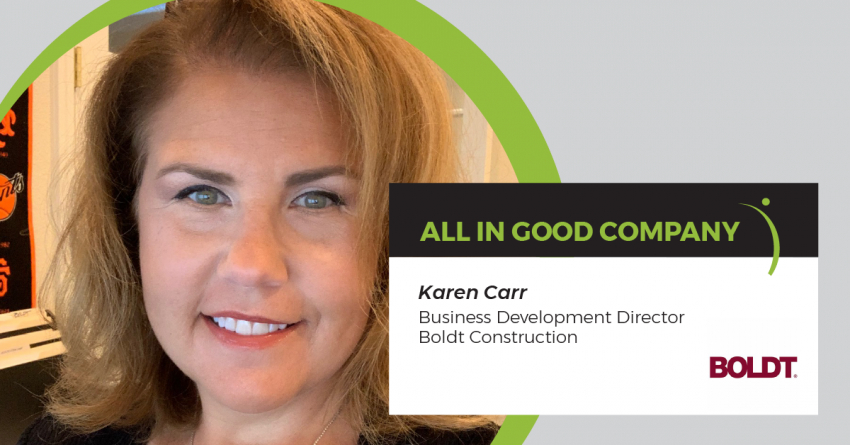Karen Carr—Business Development Director
While holding firm leadership roles throughout your career, what have you done to create a marketing mentality in your firm/office?
As standard practice at one firm, I would develop individualized marketing plans for the studio leaders as a tool to help them build their personal brand and reputation in the industry. The plan would cover things like presence on social media, certifications and licensure, involvement in professional organizations, involvement in non-profits and public speaking skills. If these categories were empty or lacking, we would develop an action plan for improvement.
As you can imagine, it was challenging at times to get some of the more “seasoned” folks up and running on social media or joining a committee when in their mind they were too busy with projects. I won some battles and others … well, you probably won’t see them posting much on LinkedIn. Then I realized, if I could start grooming the “rising stars” technical staff now, by the time they were licensed and more client-facing, they would be ready and have a marketing mentality.
I got the buy-in from the President because it would require occasional billable team members charging to overhead when attending committee meetings or events. I started with the newly licensed individuals. We set up small goals like setting up a LinkedIn page, joining a committee or finding a Toastmaster club. The response was very positive because it exposed them to this entirely new view of the industry and how they participated in marketing for the firm.
Is there someone who mentored you about marketing mentality?
I don’t recall a specific person who mentored me about marketing mentality, but throughout my career, I have leaned on my SMPS tribe a lot. I feel once you transition from the “this is my job” mindset, to “this is my career” mindset, I think we marketers naturally have this marketing mentality and want everyone to get in on that! As far as mentors go, I have several go-to people that I call upon when I’m developing a new program or dealing with a challenge in the firm. I have also had the benefit of working with great consultants like Stephanie at MARKETLINK, implementing new programs like client satisfaction surveys. These programs were always a collaboration therefore also a learning opportunity.
My two pieces of advice for young marketers just starting in this industry are 1) get involved in SMPS and 2) find a mentor. We have a unique industry where so much is learned by doing, putting in the time, and committing to continuous learning. You will not learn all you need to learn by just sitting at your desk waiting for tasks to be given to you.
How do you get firm leaders on board for your marketing initiatives?
One of the reasons I earned my CPSM when I was only four years into this career, was to give me some form of credibility in the eyes of my principals because I have an unrelated bachelor’s degree and I was in my 20’s. What did I know about marketing? I don’t know if it changed their perception of me, but it changed the perception I had of myself and that’s more valuable.
I committed myself to learning the best practices within our industry and once the firm leaders heard me speak about these ideas with confidence it gave them more confidence in me. This didn’t happen overnight of course. It was baby steps.
Sometimes it comes down to the culture of the firm and the relationship you build with leadership. If they don’t seem to budge on their mindset and perception of you, then maybe you are not in the right firm. I’m not saying to take the “my-way-or-the-highway” approach, I’m just saying that if the firm you are in doesn’t have a culture of continuous improvement and evolving with industry best practices, then it can impact your career growth and you may consider looking for other opportunities. You can’t shove it down their throats. You have to socialize ideas and prove them over time.
When you build that trust and internal credibility, then leadership is more likely to believe you and give you the opportunity to implement new ideas.
How do you get non-marketing staff involved in/excited about supporting marketing efforts?
Everyone in the company is a marketer and impacts business development. It’s about the experience people have when they interface with your company – it can be a client’s experience on a project, but also a caller’s interaction with the receptionist, or an engineer or trade partner submitting an invoice. The culture of a company and strength of the team is the foundation of making everyone being a great marketer. If people are genuinely excited to work for the company and happy with their work, it is the easiest thing in the world for them to share how amazing they think the company is, not just with their words, but with their actions too.
I find that holding team building outings helps break down barriers and builds trust and camaraderie within the team. Other ideas that are fun include volunteering at events, impromptu happy hour after work or going bowling or to the driving range. It’s always a high priority for me as a marketer to get to know people I work with as a person, outside of their job. If I have built a good rapport with individuals, it makes it a lot easier to ask them to help on a proposal or other marketing efforts.
What is the best way you have found to get your technical staff involved?
I have found that if I take the time to meet privately with a technical person who is being asked to participate on the proposal team, I can confirm they feel comfortable with what is being asked of them or answer any questions they may have and didn’t want to ask in front of the rest of the team. I want them to have a good experience, because a bad experience will make them resistant to work with marketing in the future. I want the technical folks to know I’m their advocate, sounding board and coach through the marketing process. I have helped team members who don’t feel they are strong writers write sections of proposal as they verbally explained a process to me. I have provided one-on-one coaching to team members afraid to give a presentation. I have learned over the years that when you connect with people and build a trusting relationship, they are willing to be more involved because they feel it is a team effort and the team is in it together.
What are three tips you give your marketing coordinators to help them progress and evolve in their role?
- Decide if you want a job or career: Be honest with your boss about your desired professional development path. If you or your boss need help in defining what those paths look like, there are plenty of resources on the SMPS website specific to our industry.
- Never stop learning: Commit to earning your CPSM and any other certifications relevant to the markets where you focus. I decided to also earn my LEED AP and Assoc. DBIA not only to differentiate myself from other marketers in the industry, but also to have a deeper understanding of these practices so I could talk the talk and add more value to proposals.
- Network. Network. Network. Get involved in SMPS, meet as many people as you can, and don’t stop at just marketers. Knowing the leadership from industry companies will serve you well once your role becomes more outside focused. Also, expand your horizons in the community. Get involved in a balance of organizations – professional, industry-focused and community/non-profits. Lastly, the relationships you build in your company are important too never burn bridges because your former co-workers can one day be clients! I really believe the strength and depth of one’s network is correlated with the value they bring to the company. I wouldn’t be at the level I am today without my network. As a business development professional, I need to connect with individuals or groups of people who have information that ultimately leads to business. A healthy network makes my job much easier!






